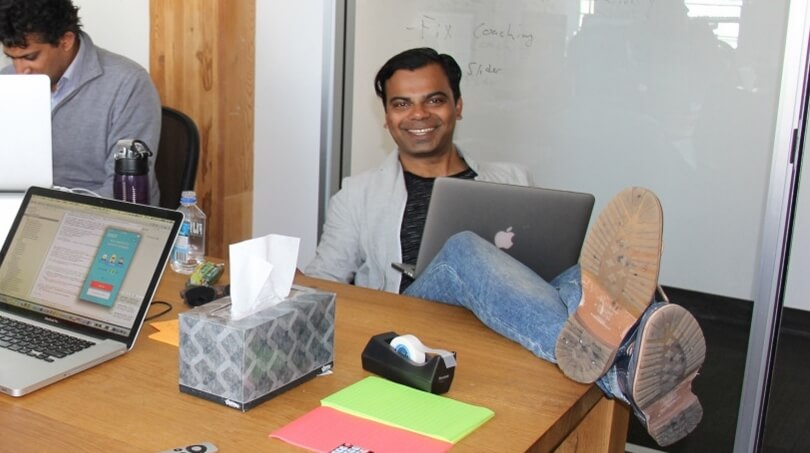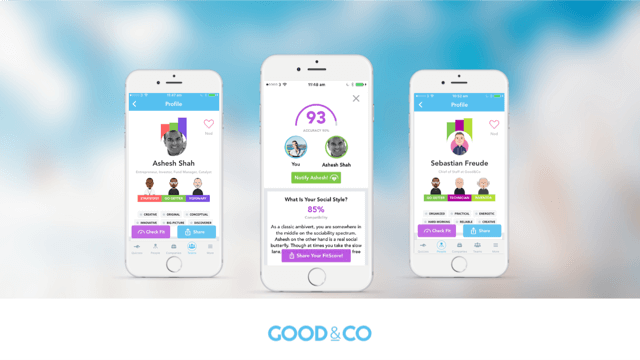Good.co: Why Culture Is The Key To A Job Well Done
Do CVs only tell half the story when it comes to recruiting the right people?

Samar Birwadker founded Good.co after being recruited in to what seemed like the perfect job, but turned out to be anything but. His idea to match people's values to company cultures earned him a lucrative tie-up with one of the world's biggest recruitment groups.
Introduce your business to us
Good.co can be summed up as LinkedIn meets eHarmony. It’s an app that helps people identify their strengths and weaknesses, but also who they are – their attitudes, beliefs and motivations.
By answering a handful of fun questions, they complete what is really a very sophisticated psychometric evaluation, which in turn tells them more about the kind of employee they are. By matching this profile to company cultures they can find out how well they fit within a business.
In a nutshell, it helps people find jobs at companies they are more likely to love. People are too reliant on resumes and skillsets, when success often means creating teams with the right relationships.
For companies, this potentially means hiring people with a better cultural fit, who will be happier and more productive. It also reduces the chances that employees will leave quickly. Employee ‘churn’ is a costly problem for businesses large and small.
Where did the idea come from?
Like many good businesses, Good.co was inspired by personal circumstances. I worked in advertising and branding for several years and I was approached by a prestigious agency to go and work for them.
Like anyone considering a job move, I did my research on the new business, did the interviews with the senior team and listened to people’s positive reviews about the agency. But despite these preparations within a month of joining I realised I was a terrible fit in my new role.
The company was great, but it wasn’t right for me. My role was wrong and I didn’t feel I could hit my potential within the team.
This is not a rare issue. Recruiters always position themselves in the best possible light to attract talent and individuals will adjust their CVs to fit, but none of this is relevant if the cultural match-up is wrong. As a result, people are leaving jobs in 18 months or two years because they aren’t happy.
How did the business develop?
It started off as a sort of Yelp for managers. People join companies but at the end of the day they leave because of teams and managers, so this approach made sense initially. But I realised it would quickly descend into a ‘he said, she said’ situation that wouldn’t be very productive.
I talked to a lot of industry experts and the solution became clear. It’s not just about working with someone you like or dislike, but understanding who you are as a professional and who you will more likely to be able to build a tribe with.
So it’s not a slagging match but a valuable exchange of information from both sides. People first discover who they are and then how they fit in certain environments. There’s no good or bad, just attributes and cultures.
Plot the growth story
We are a transatlantic company with people in London, Silicon Valley and Eastern Europe. The business was founded this way because the person behind the science, Dr Kerry Schofield, is based in London.
It started when I posted a job on Elance, which is now Upwork, to find a technical solution to a problem. Dr Schofield responded and in her pitch she basically came up with the entire answer. So I hired her and she enjoyed it so much she worked for a period for free, before ultimately becoming the chief scientist and co-founder with an equity stake in the business.
This was five years ago. Over two-to-three years we evolved the app adding new dimensions to outdated psychometric tests. We employed gamification techniques to make the experience fun and we encouraged social sharing.
It has grown to more than 15 million data points from users, both about individuals and companies. Information about the businesses comes from their own staff and because it’s informal – ie not commissioned by the company – it’s accurate and neutral. So far we have decoded about 2,000 company cultures.
We have been through several funding rounds. We took the decision to focus on building our data instead of monetising the service to create something large, interesting and valuable. But that meant we needed lots of money to scale.
We now have about 50 people and we will add another 20 this year.
How do you attract and retain good people?
Silicon Valley has a lot of flaws, but its real strength is the culture of enterprise. In the early days I was able to get amazing talent because people would forgo the opportunity to work for a big company like Google, where they could get a bigger pay cheque, because they wanted to create something unique.
They would do it for selfish reasons, which is great. They’d leverage what they learned in their next company or in their own start-up. They could learn 10 times the stuff they could anywhere else, so it was a value exchange at both ends.
What is the future of Good.co?
We were acquired by StepStone last summer and I remained CEO with a new-look board. We had done several funding rounds and were approached by several VCs, but we did the deal with StepStone because the fit was perfect for both parties.
They run some of the biggest jobs boards in the world across 20 different countries. These are great, profitable businesses, but StepStone was looking to evolve. They are using our technology to make better job matches on these boards and we are starting to integrate quizzes and fit scores on sites like Total Jobs and Jobsite.
It’s very exciting. People can now look for jobs not just based on skills and qualifications, but also on cultural fit. We think that’s huge and I’m looking forward to building the combined business in the years to come.
What’s your advice to new start-ups?
It might sound like a no-brainer, but the world moves quickly and you need to be able to adapt in time. You must be prepared to thrive in uncomfortable, unpredictable environments. In 2012, our product was a three-page website. It has grown hugely, but it’s still not perfect; no app ever is.
One of the biggest mistakes made by the start-ups I mentor today is they want to find the best idea or build the best product. I tell them to focus on the next step forward. You don’t have five-year cycles anymore, so you need to find a way to get to the next six months.
Then you determine the next step with the skills and resources you have – and so it continues. Don’t get caught up in analysis paralysis, because things change too quickly. Take it step by step and be decisive in your decisions.
Thanks for signing up to Minutehack alerts.
Brilliant editorials heading your way soon.
Okay, Thanks!




